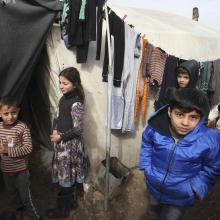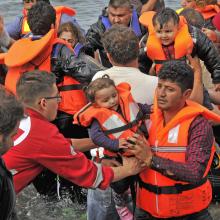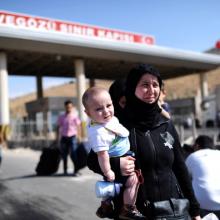syrian civil war
With his win for portraying a drug dealer with a father’s heart in the film Moonlight, Mahershala Ali became the first Muslim to take home an acting Oscar.
Ali, 43, won in the Best Supporting Actor category on Feb. 26, topping much bigger names, including Jeff Bridges, nominated for Hell or High Water, and Dev Patel, nominated for Lion.

Syrian refugees from Aleppo wait at the refugee camp in Essalame, Syria on Feb. 2, 2016. kafeinkolik / Shutterstock.com
On Dec. 14, Syrian pro-government forces breached the fragile ceasefire agreement, shelling besieged neighborhoods of Aleppo and banning civilians from fleeing. Addressing Syria, Iran, and Russia, the U.S. ambassador to the United Nations, Samantha Power, asked, “Are you incapable of shame? … Is there no execution of a child that gets under your skin? Is there literally nothing that shames you?”
As the civil war in Syria enters its sixth year, Christians across the U.S. are taking to prayer. On March 15, the fifth anniversary of the war, which has killed up to 470,000 people and displaced 7 million, the Southern Baptist Convention’s International Mission Board and a dozen other Christian groups will raise awareness in American churches through the #PrayForRefugees campaign.

Syrian refugees arrive in Lesvos, Greece in October. Anjo Kan / Shutterstock.com
Whether you like it or not, Christians are called to help the world’s most abused, hurt, helpless, exploited, and destitute.
If you’re a follower of Christ passionate about social justice, of if you attend a church that claims to be enthusiastic about global missions, or if you’re part of a Christian organization that facilitates ministry, you’ve been handed a golden opportunity — the ability to minister to millions of people in desperate need.
This is a chance to be radically countercultural — to glorify Christ through selfless sacrifice, hospitality, and love. Being a Christ-follower isn’t easy, and it will require hard work, but it’s worth it.
There’s a catch phrase that comes to the fore when people start looking for religious reasons not to enter a war like the one now raging in Syria: “Who would Jesus bomb?”
Jesus would not have bombed anyone, of course. Bombs were not weapons of choice in his day. But the cruelty of war was no stranger to his era. The Romans could be every bit as cruel as Syria’s Bashar al-Assad. They executed dissidents like Jesus himself with ease. They leveled the city of Jerusalem.
But if it is hard to imagine Jesus targeting a cruise missile aimed at another nation, it is not hard to imaging him encouraging his followers to stand with those who are most vulnerable, to seek ways to defend others from cruelty, to come to the aid of those refugees displaced by war. The question is how best to do that.
I have read countless articles from political, religious, and ethical perspectives on why or why not the U.S. should militarily intervene against the Syrian regime. Most do a decent job evaluating the situation, but I have yet to read one that really puts the human element on the table as a deciding factor.
A few months ago I was going to bed in my hotel room in Tel Aviv when I saw the breaking news alert that there was rocket exchange between Hamas and Israel in and around Gaza. While I have been to many places in "conflict," there is something much different about being somewhere that is only miles away from live fire.
I started playing out the situation in my head: "What if this expands into a major conflict? Can I catch a flight back home to be with my family before it gets worse? I'm only 30-40 miles away from the active conflict, am I already in range sitting in this hotel room?"
Anxiety. Fear. Uncertainty.
Now let me be clear, that experience of anxiety and fear is NOTHING compared to what most Israeli's, Palestinians, Egyptians, or Syrian's have felt in recent years (and MANY other populations). But — even if only in some small way — I could immediately feel the weight of pending war. It is palpable. It is crippling. And if I had my family with me, it would have potentially been unbearable.
When a head of state is responsible for the deaths of 100,000 of his people and has used chemical weapons against innocent civilians — the world needs to respond. In one massive attack, the evidence appears to show that 1,429 people, including 400 children, suffered horrible deaths from chemical weapons banned by the international community. That is a profound moral crisis that requires an equivalent moral response. Doing nothing is not an option. But how should we respond, and what are moral principles for that response?
For Christians, I would suggest there are two principles that should guide our thinking. Other people of faith and moral sensibility might agree with this two-fold moral compass.
What’s happening in Syria is awful. You see the pictures and your heart breaks. It’s horrific. Lakhdar Brahimi, U.N. special envoy to Syria, said Wednesday that, “With what has happened on the 21st of August last week, it does seem that some kind of substance was used that killed a lot of people: hundreds, definitely more than a hundred, some people say 300, some people say 600, maybe 1,000, maybe more than 1,000.”
The Huffington Post has a slider with the title, Syria War In August (Warning: Graphic Images). Of course, every life matters, but as a father with three young children, seeing the picture of a Syrian man crying out in pain as he carries the body of a young girl – words fail.
Violence and Justice
My wife knows that we promote nonviolence at the Raven Foundation, and that I lean toward pacifism. Wednesday night, as we discussed Syria and Bashar al-Assad’s continued threats of violence, she asked me, “Well, what do we do if a government uses chemical weapons against its own people?”
The question haunts me. These are times that try the soul of anyone committed to nonviolence. We all want justice. We all want the violence to stop. We don’t want any more people to cry in pain as they carry the body of a lifeless child.
And so President Barack Obama seems to be ramping up the war machine. Ironically, as he plans for possible military strikes, on Wednesday he delivered a talk honoring the 50th anniversary of Martin Luther King Jr.’s speech “I Have a Dream.” As we hear the drum beat of war, we are reminded of King’s dream of justice. In his speech King said:
We must not be guilty of wrongful deeds. Let us not seek to satisfy our thirst for freedom by drinking from the cup of bitterness and hatred. … We must not allow our creative protest to degenerate into physical violence. Again and again, we must rise to the majestic heights of meeting physical force with soul force. … [We] will not be satisfied until justice rolls down like water and righteousness like a mighty stream.
Our popular understanding of “justice” is mired with violence. For King, true justice was always based on love and nonviolence, because violence always carries with it a fatal flaw. As he wrote in his book Strength to Love, “Violence brings only temporary victories; violence, by creating many more social problems than it solves, never brings permanent peace” (18).





